
Sweet Lavender is a play in three acts by Arthur Wing Pinero, first performed in 1888. The sentimental and gently humorous story concerns the romance of Lavender Rolt and Clement Hale, and the complications impeding the course of true love.

Sweet Lavender is a play in three acts by Arthur Wing Pinero, first performed in 1888. The sentimental and gently humorous story concerns the romance of Lavender Rolt and Clement Hale, and the complications impeding the course of true love.
The original production opened on 21 March 1888 at Terry's Theatre in London, starring Edward Terry as Dick Phenyl, Brandon Thomas as Geoffrey Wedderburn, Carlotta Addison as Mrs Rolt, and Rose Norreys and Harry Reeves-Smith in the romantic leads. The play was so popular that it ran for 684 performances – a conspicuously long run for the time – until 25 January 1890; [1] on its revival less than a year later it ran for a further 737 nights. [2]
The play was produced over the next few years in Australia, Canada, Germany, India, Italy, Russia, South Africa, the United States, and the West Indies. [3] The Broadway production opened in November 1888 at the Lyceum Theatre with W J LeMoyne and Henry Miller in the cast. [4] The Australian premiere, in 1889, was presented by and starred Frank Thornton [5]

The play is set in the Chambers of Mr Phenyl and Mr Hale, No 3, Brain Court, Temple. Springtime. The present day. [6]
Ruth Rolt, a housekeeper, has a daughter, Lavender, who is in love with Clement Hale, who is studying for the bar under a disreputable but lovable barrister, Dick Phenyl. Clement is the adopted son of Geoffrey Wedderburn, a banker, who wants him to marry his niece, Minnie. Minnie has another suitor, Horace, an American. Mrs. Rolt discovers that Wedderburn is not only Clement's adoptive father but also Lavender's real father. She is very angry and breaks off the relationship between Clement and Lavender.
Wedderburn's bank is threatened with failure; he takes ill and learns humility. Mrs. Rolt forgives and nurses him, while Lavender flies back into Clement's arms to console him after the financial ruin. Phenyl unexpectedly offers his own fortune to save the bank and Wedderburn's reputation, and all ends happily.
The play was revived at Terry's in September 1890, and in February 1899. [7] It was revived at the Ambassadors in December 1922, and at the Lyric, Hammersmith in June 1932. [7] On Broadway the play was revived in 1905 (with Terry in his original role), and again in 1923. [8]

Separate Tables is the collective name of two one-act plays by Terence Rattigan, both taking place in the Beauregard Private Hotel, Bournemouth, on the south coast of England. The first play, titled Table by the Window, focuses on the troubled relationship between a disgraced Labour politician and his ex-wife. The second play, Table Number Seven, is set about 18 months after the events of the previous play, and deals with the touching friendship between a repressed spinster and Major Pollock, a kindly but bogus man posing as an upper-class retired army officer. The two main roles in both plays are written to be played by the same performers. The secondary characters – permanent residents, the hotel's manager, and members of the staff – appear in both plays. The plays are about people who are driven by loneliness into a state of desperation.

The Likely Lads is a British sitcom created and written by Dick Clement and Ian La Frenais and produced by Dick Clement. Twenty episodes were broadcast by the BBC, in three series, between 16 December 1964 and 23 July 1966. However, only ten of these episodes have survived.

Sir Arthur Wing Pinero was an English playwright and, early in his career, actor.
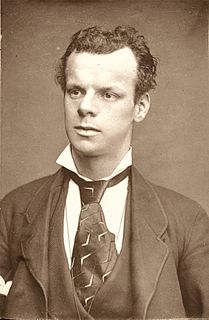
Edward O'Connor Terry was an English actor, who became one of the most influential actors and comedians of the Victorian era.
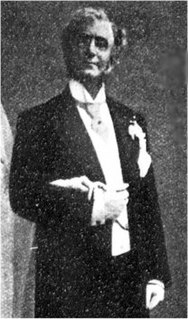
Walter Brandon Thomas was an English actor, playwright and songwriter, best known as the author of the farce Charley's Aunt.
Witness for the Prosecution is a play adapted by Agatha Christie from her 1925 short story "Traitor's Hands". The play opened in London on 28 October 1953 at the Winter Garden Theatre. It was produced by Peter Saunders.

Chili Bouchier was an English film actress who achieved success during the silent film era, and went on to many screen appearances with the advent of sound films, before progressing to theatre later in her career.

The Globe was a Victorian theatre built in 1868 and demolished in 1902. It was the third of five London theatres to bear the name, following Shakespeare’s Bankside house, which closed in 1642, and the former Rotunda Theatre in Blackfriars Road, which for a few years from 1833 was renamed the Globe. The new theatre was also known at various times as the Royal Globe Theatre or Globe Theatre Royal. Its repertoire consisted mainly of comedies and musical shows.

The 1976 Prime Minister's Resignation Honours were announced on 27 May 1976 to mark the resignation of the Prime Minister, Harold Wilson. The list of honours became known satirically as the "Lavender List".
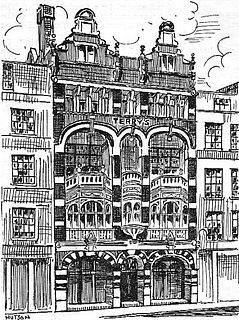
Terry's Theatre was a West End theatre in the Strand, in the City of Westminster, London. Built in 1887, it became a cinema in 1910 before being demolished in 1923.
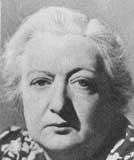
Gladys Henson was an Irish actress whose career lasted from 1932 to 1976 and included roles on stage, radio, films and television series. Among her most notable films were The History of Mr Polly (1949) and The Blue Lamp (1950).

The Magistrate is a farce by English playwright Arthur Wing Pinero. It concerns a respectable magistrate who finds himself caught up in scandalous events that threaten to disgrace him.
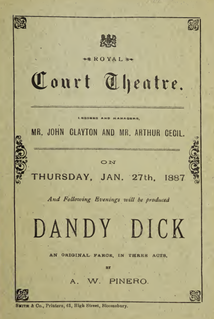
Dandy Dick is a three-act farce by Arthur Wing Pinero, first performed in London in 1887. It depicts the complications arising when a respectable clergyman is persuaded to bet on a horse race to subsidise building works on his church. The play has been revived several times and has been adapted for the cinema, radio and television.

Hazel M. Neilson-Terry was an English actress. A member of the theatrical dynasty the Terry family she had a successful stage career, and also made some cinema films. Among her roles was Ophelia in Hamlet opposite her cousin John Gielgud.

Leah Kleschna is a drama in five acts by C.M.S. McLellan produced for the first time on Broadway by Minnie Maddern Fiske, Harrison Grey Fiske and the Manhattan Company with set design provided by Frank E. Gates and E. A. Morange.
Sweet Lavender is a 1915 British silent romance film directed by Cecil M. Hepworth and starring Henry Ainley, Chrissie White and Alma Taylor. It is based on the 1888 play Sweet Lavender by Arthur Wing Pinero.

Sweet Lavender is a 1920 American drama film directed by Paul Powell, written by Beulah Marie Dix, and starring Mary Miles Minter, Sylvia Ashton, J.M. Dumont, Starke Patteson, Milton Sills, and Harold Goodwin. It was released in October 1920, by Realart Pictures Corporation, and was adapted from the 1888 play of the same name by Arthur Wing Pinero.

John Clayton was an English actor. After building a career in a range of parts, he became best known for his roles in the farces of Arthur Wing Pinero. With Arthur Cecil he was joint manager of the Court Theatre in London from 1883 until his death, aged 43, while on tour in Liverpool.
Carlotta Addison was an English actress. Stage appearances included leading roles in original productions of plays by T. W. Robertson, W. S. Gilbert, H. J. Byron and Arthur Wing Pinero.